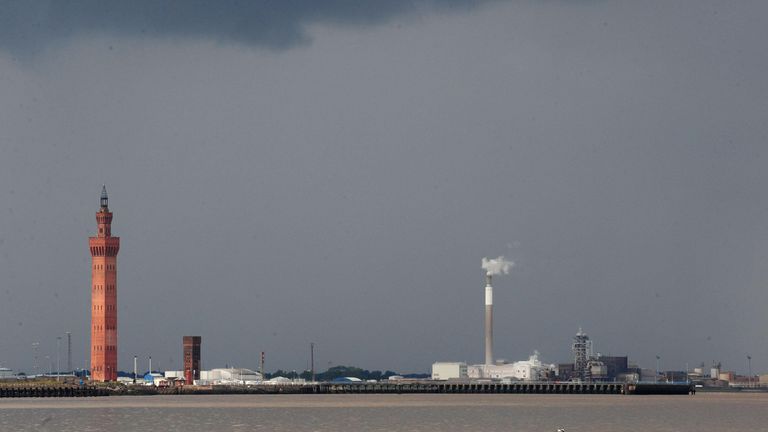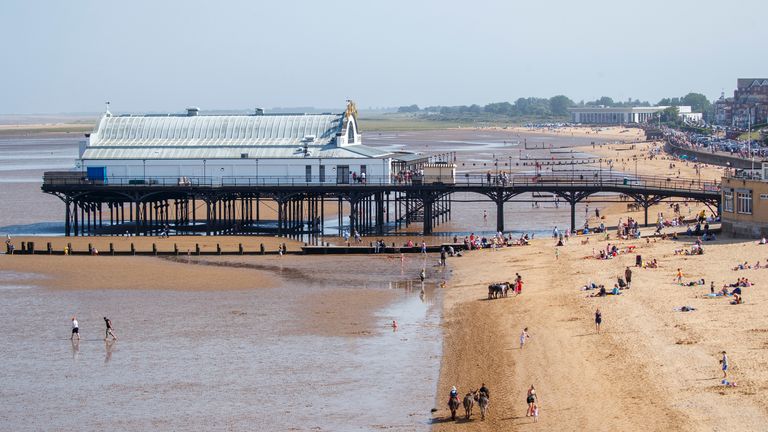Britain’s electoral map could look dramatically different after voters go to the polls this year.
Labour is on course for a majority but in parts of the North of England and the Midlands, the battle is by no means straightforward.
Galloway met with silence in Commons – politics latest
Here, there are a number of historical Labour strong-holds where voters are more likely to be white, working class and to have voted leave in the referendum.
Grimsby, a port town in North East Lincolnshire, is one such example.
Like other so-called “Red-Wall” seats, it turned Conservative for the first time since the end of the Second World War in 2019, with many people at the time feeling a cultural rift with the Labour Party.
This constituency has now been combined with Cleethorpes, where the Tories have been in power since 2010.
Since its formation in 1997, Cleethorpes has been a bellweather seat, backing the largest party in Westminster.
It contains a rural conservative base as well as urban voters who in more recent years backed the promises of levelling up and Brexit offered by the Tories.
The complex composition of this new constituency means it’s shaping up to be an interesting battleground.
Boris Johnson’s personal appeal, his party’s promise to “Get Brexit Done” and a promise to level up poorer parts of the country was a winning ticket for the Tories here.
Fast forward five years and disillusionment with the Conservatives is rife.
A Cost-of-Living crisis has eroded living standards and the promise of “levelling up” appears to have been forgotten.
Net migration to the UK is at a record high and the tax burden at a post war high.
Tory party infighting, repeated leadership contests and a chaotic premiership under Liz Truss have eroded the public’s trust.
Support for the Conservatives may be fading but that wont necessarily translate into strong support for Labour.
The Reform party is gaining ground in pro-leave constituencies, picking up their 2019 Tory voters.
The rebranded Brexit Party, led by Richard Tice and co-founded by Nigel Farage, has described itself as “the party of the working class”.
The party is polling at about 10 per cent.
While this may not be enough to deliver the Reform a single seat in parliament it could damage the Tories by splitting the vote and helping to deliver a Labour majority.
We saw this play out at the by-elections in Wellingborough and Kingswood.
However, Reform doesn’t have candidates everywhere yet, including in Great Grimsby and Cleethorpes. Instead, voter disillusionment and low turnout could be a bigger problem for the Tories than outright conversion to Labour.
Labour needs an 11.7 point swing to win in this new constituency and it has reason to be quietly confident.
The party has achieved larger swings at recent by-elections.
However, winning in places like Grimsby and Cleethorpes will be important if it is to secure the 12.7 point swing needed across the country to win a majority in parliament.
Labour lost people in Grimsby to Boris Johnson’s Tories in 2019.
Back then voters questioned the culture of the Labour party, whether it really stood for people like them, the working classes.
Labour will need to win them back but, in both Grimsby and Cleethorpes, it’s also contending with disillusionment with both main parties.
Sky News’ Target Town series aims to follow the build-up to the general election from a key constituency prized by both Conservatives and Labour – Great Grimsby and Cleethorpes.
To launch it The UK Tonight with Sarah-Jane Mee will broadcast live from Cleethorpes at 8pm.


